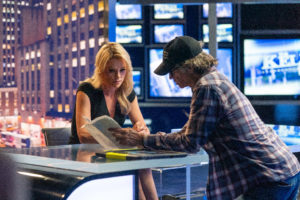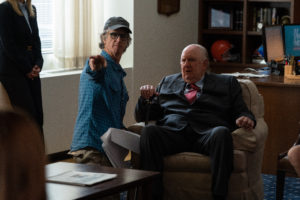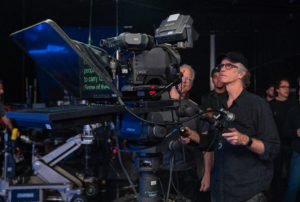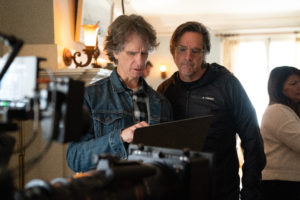Having directed the recent politically-oriented dramas Recount, Game Change, Trumbo, and All the Way, Jay Roach was naturally offered the Fox News-based drama Bombshell, releasing today.
“You only get offered the things that you’ve already done,” Roach revealed of Hollywood’s classic preferences. “I do just have a strong desire to figure out what happened in these situations. It’s a good place to start as a storyteller.”
With a production on the complex scale of Bombshell, focusing on the sex scandal involving cable TV’s Fox News chief Roger Ailes, Roach knew that learning about the company and its people would be of utmost importance.
“I don’t necessary feel like I know enough to be preaching, but to be asking questions,” Roach said of his story’s intense subject matter and controversial figure in Ailes. “New questions come up—not easy answers, but complicated predicaments and agendas, clashing within an individual person.”
Bombshell first came as a Charles Randolph screenplay to star Charlize Theron who plays Fox News anchor Megyn Kelly. After Theron was attached, not only as star, but also as one of the film’s producers, she brought it to Roach.

“What would it be that I would say no to?” quipped Roach of Theron’s offer. “Just the process of working with her both as an actor and as a producer—she takes the producing part seriously. We went through some turbulent times, and she navigated us through that. She’s one of the great actors of this era—very compelling, but also very funny. [She possesses] all of the things that you hope you can bring to a character to do them justice, especially in this somewhat political context.”
Even though Roach worried that the potential viewing audience would be interested enough in the issues in Bombshell, a dream team of performers quelled his fears as they joined the cast.
“There’s so many people who jumped in once they knew Charlize was involved,” Roach described of his principals, “and then we had to call in Margot [Robbie]. Everyone is someone in the room you want to be acting against.”
As he knew he had top talent on his set, including John Lithgow as Ailes, Nicole Kidman as Fox News hostess Gretchen Carlson, and Robbie as an amalgam of young upstarts at the network, Roach took an unconventional approach to shooting coverage of key scenes.
“We have cameras rolling in all directions—I always try to keep it alive and feel like it’s real-time,” he said, then referencing a pivotal scene between Lithgow and Robbie.
“You need that level of casting. We knew it would be excruciating. We didn’t do a lot of takes—I knew how hard on Margot and John it would be because it’s meant to be incredibly awkward, [and] that turns really dark. They were both trying to figure each other out as performers. Roger’s laying a trap for her; she doesn’t see it coming.”
One striking aspect in Bombshell’s world is the realistic likeness makeup on each of the main performers. “It was really important to Charlize,” Roach unveiled of Theron’s desire to physically resemble Kelly.

“She really cares about trying to be as authentic as she can. We all want to get it as close to what it really felt like. Her outward appearance helped her channel Megyn’s inner persona. She went further than what I might have gone. It’s going to be an extra thing [with several hours in the makeup chair]. But she said, ‘I bet it is going to be worth it.’ The performance helps the look, and the look helps her performance.”
Indeed, viewers watching Theron, Kidman, Lithgow and others in Bombsell have wondered aloud if they are seeing archival footage instead of actors in prosthetic makeup.
“That’s not an uncommon thing,” Roach said. “It undersells how much of it is about performance. Kazu Hiro’s makeup is unbelievable.”
Makeup department head Vivian Baker oversaw the entire production, while the aforementioned Kazu Hiro designed prosthetics for the notable leading characters, including a brief appearance by Malcolm McDowell as Fox president Rupert Murdoch.

Alas, Theron’s significant time onscreen mandated that her makeup by fully realistic. “It was comfortable, and she could emote through that,” Roach explained. “The muscles were tied to the makeup. That’s what the really great makeup people do—make it easy for the performers. I encouraged John to try it; he was skeptical at first. It’s a little different for every character, committing to the authentic feel and vibe.”
Throughout his 20+-year career as a director of top studio projects, Roach has garnered unforgettable performances from his casts, and Bombshell might be among the foremost ensemble pieces in Roach’s credits.
“I try to be extremely empathetic with what every actor is thinking about,” Roach divulged about his work with actors. “I always ask up front when I am sitting down with them: let’s not only talk about character but also about process. ‘What’s the best way for me to give notes?’ I don’t want to get in your way or just let things slide. Each person has very different ideas about how they would like the project to go—I try to be extremely sensitive to that.”
Not only have Roach’s dramatic films featured overpowering acting showcases, but they have also delivered compelling stories.
“My devotion is to the story and the actor’s desire to do the best they can,” he confessed. “I try to put that idea forward: it’s not about me, it’s about them doing their work and serving the story. They are pretty blunt about what they want; you are not going to use their process against them or push back.”
Early in Roach’s directing career, he was most known for the Austin Powers and Meet the Parents films and select sequels, and he distinguished that work from his current crop of straight dramas.
“Because I came from comedy, you do have to roll with every specific process,” he recalled. “Some people like to stop and do repeats of a line to get it right. It’s more consistent in drama—there’s a little less diversity in terms of approach. Most dramatic actors are trained a certain way. I do try to adjust my own directing process.”
Comparing his early comedies to the new dramas, Roach noted that they each have their own joys, frustrations, and challenges. “There aren’t that many great comedy scripts that come to me [now] because I’m pigeonholed as a dramatic director,” he joked, noting that he has been fully satisfied with the nuances in his recent newsworthy cinematic work.

“I have a compulsion to figure out what it going on. What are the personalities that we are looking to and [their] flaws? How shall we proceed? I am drawn to trying to figure it out. It’s more a compulsion than a choice.”
In Bombshell, as with Recount and Game Change, Roach realized that he was unearthing notorious moments in the nation’s contemporary history, often seen in real time by hundreds of millions of Americans.
As such, he felt an urgent responsibility to tell these stories with the most verisimilitude possible, within the package of a narrative feature film.
“These stories are too important to the real people involved to mess with them too much,” Roach detailed, stating that he has been keenly aware of the hypothetical audience.
“You have to compress the story into movie length that has a poetic, distillable length and scale. I do feel that obligation. These are real-life stories I’m trying to tell. The audience is showing up [to see] a true story.”
Given his late-2000s and 2010s predilections, Roach ascribed his affinity for Bombshell and his other dramas to his journalistic training and innate curiosity.
“I try to go to the sources,” he said. “I got to speak quite a bit to Trumbo’s daughters and people who had been around LBJ. Tracking down people who had experienced abuse at Fox News—some things that people had not revealed in public. What I got from it, not just in terms of authenticity, was also trying to get, ‘What did this feel like?’ To talk to women and have them go into detail about what they went through and what the implications were. Power and control and egos run amok be affirmed. Sexuality is part of it, but it is so much more about egocentric, sociopathic, narcissistic psychology at the center of these stories.”
To that point, Roach heard from women at Fox News who described how Roger Ailes behaved in person. “That’s the first thing: to get as close to something that I want people to empathize with on the most human level,” he conveyed.
“’What was it like for you in terms of your career, your life, your goal, your identity? What did you care about? What was painful? How did you cope with that?’ Those questions. People who know you, they will become your collaborators—you need them. I don’t think you can get there just reading the books.”

Upcoming, Roach hopes to direct a Day for Night-style story about the filmmaking process—a comedic film with setpieces which might turn into a musical.
“Big physical set pieces that we did in Austin Powers,” Roach forecasted. “Busby Berkeley dance numbers; pure spectacle on a big scale that people on comedies don’t get to do. [In the Austin Powers sequels], they gave us funds to try big spectacle things. I would love to find one that lets us do big spectacle in a musical-comedy thing.”
Completely opposite from such a potential project, Roach is also attached to 67 Shots, a serious drama about the 1970 Kent State University massacre on the imminent occasion of its 50th anniversary. Roach would like to approach that project as a limited series and not a feature film.
Of the Kent State project’s radical dissimilarity from the intended musical-comedy, Roach simply said, “I am a little split personality.”





